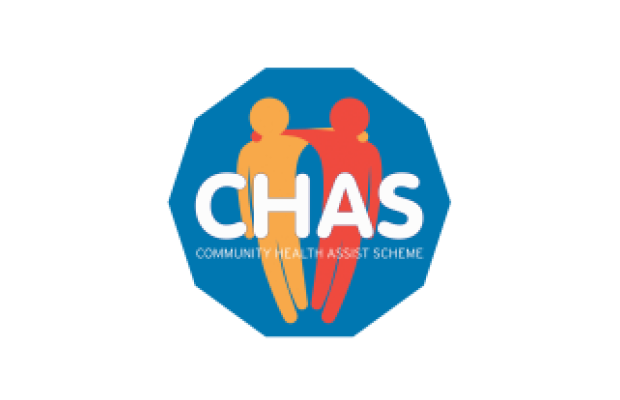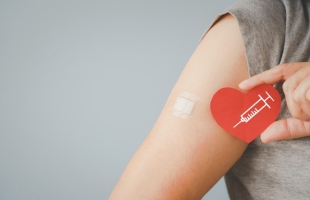Stay Protected with Vaccinations for Every Life Stage
Vaccination plays an important role in protecting your health and supporting the well-being of those around you. It helps reduce the risk of serious illness by strengthening your body’s defences, prevents the spread of infectious diseases through wider community coverage, and contributes to a healthier society by lowering the chances of outbreaks. As our needs change over time, different vaccines become relevant at different stages of life. This is why Healthway Medical provides a comprehensive range of vaccinations aligned with Singapore’s national immunisation schedules, including those for children, adults, and individuals preparing for travel. Whether you are planning your child’s vaccinations, keeping your own protection up to date, or getting ready for an overseas trip, these vaccines are available at our clinics across Singapore to support your health at every stage of life.
Book Your Vaccination
How Vaccines Protect Individuals and Communities
Vaccination does more than reduce the chances of an individual falling ill. It also helps limit the spread of infectious diseases across the wider population. When more people are vaccinated, infections have fewer opportunities to circulate, making it harder for diseases to infect the most vulnerable. This includes those who cannot receive certain vaccines due to age, allergies, or medical conditions. As a result, vaccination plays a vital role in protecting both personal health and public well-being.
To better understand the value of this protection, it helps to know what happens inside the body when you receive a vaccine.
How Do Vaccines Work?
Vaccines prepare your immune system to detect and respond to harmful infections. They introduce a harmless component of a virus or bacterium, which might be a weakened or inactivated version, or just a small identifiable part of the pathogen. This safely prompts your immune system to create antibodies that can recognise and fight the real infection if it appears later on.
Through this process, your body gains immunity without having to fall ill. This preparation not only reduces the risk of illness, it also limits the spread of infections within the community. Understanding this process also prompts us to ask how long such protection lasts and whether it needs to be maintained over time.
Why Staying Up to Date Matters
Vaccine-induced immunity does not always persist throughout life. In some cases, the immune response generated by an earlier dose might decline gradually, reducing the level of protection over time. This is known as waning immunity. In other situations, the pathogen itself might undergo genetic changes that alter its behaviour or structure. When this occurs, earlier vaccines can become less effective, as they no longer align with the circulating form of the disease. To maintain robust protection, some vaccines are given at regular intervals, while others are periodically reformulated to address emerging strains.
Staying up to date ensures that your immune system remains primed and responsive as your health needs shift across different life stages and circumstances.
Who Should Consider Additional Vaccines
As your needs change with age, lifestyle, medical history or travel plans, certain vaccines might be added to those received earlier in life. For instance, an adolescent girl might be advised to receive the human papillomavirus (HPV) vaccine to reduce the risk of cervical cancer linked to specific HPV strains. Adults could benefit from the herpes zoster vaccine, especially as the likelihood of developing shingles increases with age, particularly in those who have had chickenpox. Travellers heading out of Singapore might require vaccines such as yellow fever or meningococcal disease, especially when visiting regions with higher transmission risks or attending mass gatherings like Hajj.
Recognising how your needs evolve as you progress through different stages of life can help you stay protected and prevent avoidable health issues. In the next section, you’ll find vaccination recommendations grouped by age and context to guide your next steps.
Whether it’s for work, travel, school, or peace of mind, staying up to date on your vaccines makes all the difference.
Vaccines for Children, Adults, and Travellers
As you progress through different stages of life, your health needs shift, and vaccinations continue to play an important role in supporting long-term protection. Whether you plan to register your child for scheduled vaccinations, keeping your own defences up to date, or preparing to travel out of Singapore, this section helps you understand which types of vaccines are relevant.
Vaccinating your children is one of the most important ways to protect them from serious, preventable diseases. In Singapore, the National Childhood Immunisation Schedule (NCIS) recommends key vaccines across infancy and adolescence to help build strong and lasting protection at every stage of growth.
Infants and Young Children
In their formative years, vaccines help safeguard children against dangerous infections while their immune systems are still developing. Some are given as combination shots to reduce the number of injections needed.
Vaccines commonly given during this stage include:
- Diphtheria, Tetanus, and Pertussis (DTaP)
- Inactivated Polio Vaccine (IPV)
- Haemophilus Influenzae type B (HiB)
- Hepatitis B (HepB)
- Measles, Mumps, and Rubella (MMR)
- Pneumococcal Conjugate Vaccine (PCV)
- Varicella (Chickenpox)
- Bacillus Calmette–Guérin (BCG)
To streamline the vaccination process, these are also available in combination forms:
- 5-in-1 Vaccine: DTaP + Hib + IPV
- 6-in-1 Vaccine: DTaP + Hib + IPV + HepB
Vaccines for BCG, diphtheria, and measles are mandatory by law in Singapore.
Many of these childhood vaccines are available at Healthway Medical clinics, and you may also pre-book your child’s 5-in-1 or 6-in-1 vaccinations during routine visits.
Older Children and Adolescents
As children grow, their vaccine needs continue to evolve. During the later school years, additional vaccines are introduced to extend protection from earlier childhood and to guard against new health risks that become relevant during adolescence.
Key vaccines during this stage include:
These vaccines are typically given during adolescence as part of ongoing preventive care.
Vaccination remains an important part of preventive care in adulthood. In Singapore, the National Adult Immunisation Schedule (NAIS) outlines key vaccines recommended for individuals aged 18 and above to help protect against preventable diseases and support long-term health at different stages of adult life.
Vaccines commonly recommended for adults include:
- Covid-19
- Dengue Vaccine
- Hepatitis A (HepA)
- Hepatitis B (HepB)
- Hepatitis A + B (Combination)
- Herpes Zoster (Shingles)
- Human Papillomavirus (HPV)
- Influenza
- Measles, Mumps, and Rubella (MMR)
- Meningococcal
- Pneumococcal (PCV13 / PPSV23)
- Respiratory Syncytial Virus (RSV)*
- Shingles
- Tetanus, Diphtheria, and Pertussis (Tdap)
- Typhoid
- Varicella (Chickenpox)
*Recommended for older adults or individuals with higher health risks. Speak with a doctor to check what applies to you.
When travelling out of Singapore, certain vaccines might be recommended or required depending on your destination, activities, and health status. These vaccinations help protect against infectious diseases that are more common overseas and might also be needed to meet entry or pilgrimage requirements.
Vaccines commonly recommended for travellers include:
- Dengue Vaccine
- Hepatitis A (HepA)
- Hepatitis B (HepB)
- Hepatitis A+B (Combination)
- Influenza
- Measles, Mumps, and Rubella (MMR)
- Meningococcal
- Tetanus, Diphtheria, and Pertussis (Tdap)
- Typhoid
- Yellow Fever

Vaccines are vital in preventing serious diseases and safeguarding communities through immunity and disease control.
Dr John Cheng Ping-Chang, Healthway Medical Group's Chief Medical Officer (CMO)

Updates to the flu vaccine is released twice a year
The flu vaccine is typically recommended on an annual basis, as the influenza virus can change from year to year. Each year, the World Health Organization (WHO) and other health authorities review the circulating strains of the flu virus and create a vaccine tailored to provide protection against the most common strains expected to cause illness that season.
Healthway Medical clinics provide quadrivalent flu vaccinations that protect against four different flu viruses; two influenza A viruses and two influenza B viruses.
This flu vaccine is released twice a year during April / May and September / October (for the Southern Hemisphere influenza season and Northern Hemisphere influenza season respectively). Each new release contains different strains of flu virus that are expected to be the most common for that season, so as to provide optimal protection against flu viruses.
Why Choose Healthway Medical for Vaccination?
At Healthway Medical, we offer a range of vaccination services to ensure you and your family are protected against preventable diseases. Our friendly healthcare professionals can help guide you on the right vaccines based on your age, health status, and lifestyle.
- Comprehensive vaccine options for children, adults, and those who are travelling.
- Personalised consultations to determine which vaccines are right for you.
- Convenient appointment scheduling at our clinics.
Vaccination Myths & Facts
Fact: This myth started with a fraudulent study in 1998 that was later discredited and retracted. Extensive research since then has found no link between vaccines (including the MMR vaccine for measles, mumps, and rubella) and autism. Vaccines are safe and do not cause autism.
Fact: While natural immunity occurs when you get an infection, it comes with the risk of serious illness, long-term complications, or death. For example, getting measles or chickenpox can lead to complications like pneumonia, brain swelling, or even death. Vaccines provide a safer, more controlled way to develop immunity without risking those dangerous side effects.
Fact: Vaccination is important for people of all ages, including adults. Immunity from childhood vaccinations can weaken over time, and some diseases can affect adults more severely. For example, adults should receive the flu vaccine, the shingles vaccine after 50, and the Tdap vaccine (for tetanus, diphtheria, and pertussis) throughout life.
Fact: The flu vaccine does not give you the flu. The vaccine contains an inactivated or weakened form of the virus, which cannot cause illness. Some people might experience mild side effects, like a sore arm or a low-grade fever, which are normal reactions as the body builds immunity, but they are temporary and much milder than actual flu symptoms.
Fact: Vaccines are one of the most rigorously tested and safest medical products available. They are subject to extensive clinical trials and continuous monitoring for safety even after they’re approved. The benefits far outweigh the risks. Serious side effects are extremely rare.
Fact: Vaccines are highly effective at preventing the spread of disease. Diseases like polio, smallpox, and measles have been dramatically reduced or even eradicated in many parts of the world due to vaccines. While no vaccine is 100% effective, most provide strong protection against serious illness and complications.
Fact: Vaccination schedules are designed to protect children at the earliest possible age when they are most vulnerable to severe illness. Many vaccines, like the Hepatitis B vaccine, are most effective when given during infancy. Delaying vaccination leaves your child unprotected and at higher risk for serious infections.
Frequently Asked Questions About Vaccinations
In Singapore, recommended vaccines are guided by age and health needs through the National Childhood Immunisation Schedule (NCIS) and the National Adult Immunisation Schedule (NAIS). As you progress through different stages of life, your vaccination needs might change based on factors like medical history, lifestyle, and existing immunity. If you're unsure which vaccines apply to you, speak with a doctor who can review your records and recommend the most relevant protection for your current circumstances.
Vaccination trains your immune system to recognise and fight harmful viruses or bacteria before they make you seriously ill. It works much like updating the software on a smart device, giving your body the tools it needs to stay protected as threats change over time. Beyond personal protection, vaccination also helps reduce the spread of disease within the community, especially to those who cannot be vaccinated, such as infants, the elderly, or people with certain health conditions.
Vaccines train your immune system to recognise and fight harmful germs before they make you sick. There are six main types: live attenuated, inactivated, subunit, toxoid, viral vector, and mRNA. Each works differently, from using weakened viruses to delivering genetic instructions, but all help your body build immunity in a safe and controlled way. The type used depends on the disease being targeted and your individual needs, such as age, health or medical suitability.
Yes, childhood vaccinations used in Singapore are thoroughly tested and approved for safety. They are monitored by health authorities and backed by strong global evidence showing they help protect children from serious, preventable diseases. Like any medication, vaccines might cause mild side effects such as slight fever or body aches, but serious reactions are very rare. If you have questions about your child’s vaccination plan, a doctor can guide you based on your child’s age and health needs.
Ideally, travel vaccinations should be given four to six weeks in advance, as it can take up to two weeks for your body to build immunity. However, getting vaccinated even a few days before you leave Singapore might still offer some protection, especially for certain high-risk destinations. Speak with a doctor as soon as possible to assess your travel plans and determine which vaccines are important or mandatory for the country you’re visiting.
What are the Singapore Government's subsidies for the flu vaccination?
 |  |  |
| Singaporeans will be able to use up to $400 of their Medisave per account, under the Medisave400 scheme, for all recommended vaccinations for the target adult population groups in the NAIS. | You can also use your child's Baby Bonus for immunisation programmes at approved healthcare institutions. Click Here | You can also use CHAS subsidies for vaccinations at Healthway Medical. Click Here |
| Medisave can also be used to pay for all the vaccinations under the National Childhood Immunisation Schedule (NCIS). Patients and their immediate family members can use up to $400 per year, per Medisave Account to pay for the approved vaccinations. | Healthway Medical is proud to be a participating CHAS GP and dental clinic that provides affordable healthcare for the community. |
Related Articles
Learn more by reading our vaccination related articles!

Flu Vaccine
The flu vaccine offers yearly protection and plays a key role in reducing the risk of serious complications.

MMR Vaccine
The MMR vaccine remains your best protection against measles – a highly contagious yet preventable disease.

Vaccinations for Adults
Vaccination isn’t just for children – adults need protection too, especially against preventable diseases that can resurface later in life.


